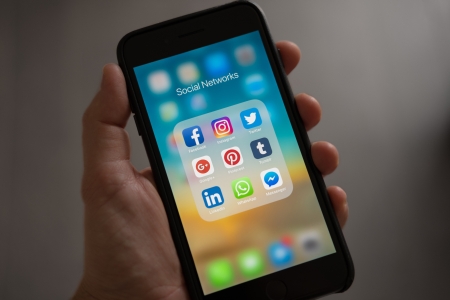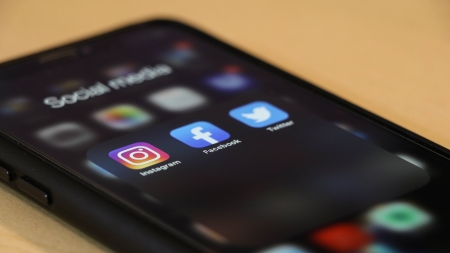The Public Relations Blog
We frequently blog about the latest public relations corporation communications, and marketing topics, tips, and trends. Our blog is one of the 100 Best Public Relations Blogs, according to FeedSpot. Please help yourself to our insights and be sure to subscribe to our weekly blog notifications.
A guide to the five types of media your company needs
Before diving head-first into the different types of media, it’s important to first dip your toes in the water and learn what media is. Media is a communication tool used to deliver information. The three types of media are commonly known as news media, social media, and web media, but you might also see them referred to as earned media, shared media, and owned media.
Some other forms of modern media are print media, television, movies, and video games.
Read More
Topics: shared media, earned media, owned media, social media, news media, web media
Social media is a necessary tool to successful PR campaigns
Social media is about conversations, community, and connecting with your audience. It’s not just a broadcast channel or marketing tool. You need to be authentic and candid with your audience to make a connection.
Social media is also known as shared media, which is user-generated content that can be shared on multiple platforms with friends, family, business associates, and buyers of your products and services. Social media users want to be informed, entertained, and connected with other users. To this end, you must customize each post so it is native to each platform. For example, you wouldn't post the same content on Instagram as you would on Facebook because the tone, audience, and demographics are different.
Read More
Topics: PR tips, shared media, social media
Each social media platform should have uniquely tailored content
Understanding each social media platform’s purpose and its audience is vital if you want to produce content that is attractive and engaging to users.
What if I told you that your company is doing social media all wrong? Stay with me.
To create content that attracts and engages your audience, you need to know and respect them. You can do this by understanding the platforms your audience uses to communicate.
Read More
Topics: shared media, social media
Marketers should take note: Men are finally migrating to Pinterest.
Men are taking on the aesthetically pleasing world of Pinterest, and public relations and marketing professionals should take note.
Pinterest is an American image sharing and social media service designed to enable saving and discovery of information with images and, on a smaller scale, animated GIFs and videos. This is done by scrolling through and saving pinboards.
Although women make up 60% of the app, male numbers have been on the rise since the beginning of quarantine in March 2020.
Read More
Topics: shared media, social media
As a public relations professional, it’s our job to stay up-to-date on the digital world. It is important to familiarize yourself with new trends and the tools and technology needed to succeed on social media.
Currently, the most popular social media platform is Facebook with about 2.45 billion active users. Although Facebook may be at the top right now, anything could rapidly increase or decrease its popularity. For example, WhatsApp has seen a huge increase in downloads due to the COVID-19 pandemic.
Read More
Topics: shared media, social media, PR planning
Per-follower engagement on Instagram is 58 times higher than Facebook and 20 times higher than Twitter.
If your company isn’t on Instagram, there’s no time like the present. Instagram is bursting with the opportunity to boost brand awareness and connect with your audience, altering company storytelling. Don't let fear or inexperience hold you back from what Instagram could do for you. Instead, focus on all that you could accomplish with a little bit of direction.
Read More
Topics: social media
In most cases, Facebook can be a delightful asset to your company, generating goodwill between you and your customers or generating strong leads that allow the inbound marketing strategy to fall perfectly into place. However, at times, Facebook can breed negativity.
When that happens, you don’t want to waste time being unprepared.
Read More
Topics: crisis communications, social media
People want to share their ideas and be heard, and social media is how they fulfill that desire. Having access to various platforms is a valuable opportunity to listen to your audience and gain insight into their values and feedback. However, it’s not enough to simply have an account; you must know both the platform and your community to become a valuable and trusted resource to your audience.
Here are some things to keep in mind to improve your social media presence.
Read More
Topics: social media
Use these two questions to guide your content-making process
In public relations, content of all kinds is important. Whether it’s videos, written content, or any other kind of information people can consume, content is one of the biggest drivers for public relations. Content helps you stand out from your rivals.
However, you need to be making the right kinds of content to further your public relations goals. Simply making anything isn’t enough. Use the two questions below to see if your content is actually helping your public relations plans.
Read More
Topics: PR tips, content management, social media
This is one blog post about organic social media content. Read Organic social: Is it worth it in 2020? for more.
Think one-size-fits-all? Think again.
Any social media manager will praise the benefits of social media monitoring and scheduling tools, like HubSpot. They allow you to monitor multiple streams, coordinate responses with a team, and, perhaps most importantly of all, schedule your social media posts. You can even post to multiple social networks at once. Some platforms encourage you to post your content in multiple places within the same platform (for instance, Facebook newsfeed and Facebook stories).
Just because you can post one update to multiple places at once, should you? No, and here’s why.
Read More
Topics: social media












Comment on This Article